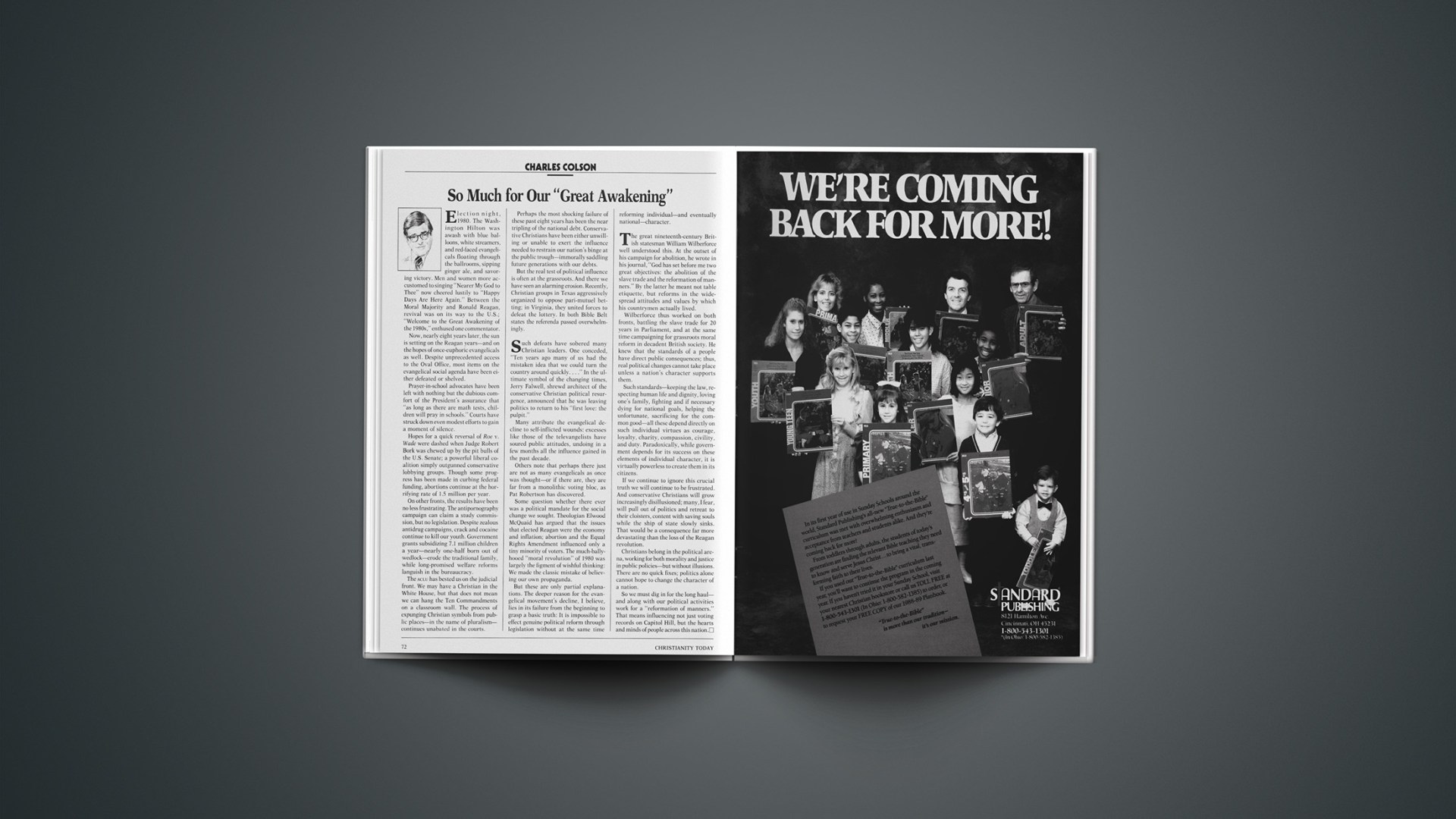Election night, 1980. The Washington Hilton was awash with blue balloons, white streamers, and red-faced evangelicals floating through the ballrooms, sipping ginger ale, and savoring victory. Men and women more accustomed to singing “Nearer My God to Thee” now cheered lustily to “Happy Days Are Here Again.” Between the Moral Majority and Ronald Reagan, revival was on its way to the U.S.; “Welcome to the Great Awakening of the 1980s,” enthused one commentator.
Now, nearly eight years later, the sun is setting on the Reagan years—and on the hopes of once-euphoric evangelicals as well. Despite unprecedented access to the Oval Office, most items on the evangelical social agenda have been either defeated or shelved.
Prayer-in-school advocates have been left with nothing but the dubious comfort of the President’s assurance that “as long as there are math tests, children will pray in schools.” Courts have struck down even modest efforts to gain a moment of silence.
Hopes for a quick reversal of Roe v. Wade were dashed when Judge Robert Bork was chewed up by the pit bulls of the U.S. Senate; a powerful liberal coalition simply outgunned conservative lobbying groups. Though some progress has been made in curbing federal funding, abortions continue at the horrifying rate of 1.5 million per year.
On other fronts, the results have been no less frustrating. The antipornography campaign can claim a study commission, but no legislation. Despite zealous antidrug campaigns, crack and cocaine continue to kill our youth. Government grants subsidizing 7.1 million children a year—nearly one-half born out of wedlock—erode the traditional family, while long-promised welfare reforms languish in the bureaucracy.
The ACLU has bested us on the judicial front. We may have a Christian in the White House, but that does not mean we can hang the Ten Commandments on a classroom wall. The process of expunging Christian symbols from public places—in the name of pluralism—continues unabated in the courts.
Perhaps the most shocking failure of these past eight years has been the near tripling of the national debt. Conservative Christians have been either unwilling or unable to exert the influence needed to restrain our nation’s binge at the public trough—immorally saddling future generations with our debts.
But the real test of political influence is often at the grassroots. And there we have seen an alarming erosion. Recently, Christian groups in Texas aggressively organized to oppose pari-mutuel betting; in Virginia, they united forces to defeat the lottery. In both Bible Belt states the referenda passed overwhelmingly.
Such defeats have sobered many Christian leaders. One conceded, “Ten years ago many of us had the mistaken idea that we could turn the country around quickly.…” In the ultimate symbol of the changing times, Jerry Falwell, shrewd architect of the conservative Christian political resurgence, announced that he was leaving politics to return to his “first love: the pulpit.”
Many attribute the evangelical decline to self-inflicted wounds: excesses like those of the televangelists have soured public attitudes, undoing in a few months all the influence gained in the past decade.
Others note that perhaps there just are not as many evangelicals as once was thought—or if there are, they are far from a monolithic voting bloc, as Pat Robertson has discovered.
Some question whether there ever was a political mandate for the social change we sought. Theologian Elwood McQuaid has argued that the issues that elected Reagan were the economy and inflation; abortion and the Equal Rights Amendment influenced only a tiny minority of voters. The much-bally-hooed “moral revolution” of 1980 was largely the figment of wishful thinking: We made the classic mistake of believing our own propaganda.
But these are only partial explanations. The deeper reason for the evangelical movement’s decline, I believe, lies in its failure from the beginning to grasp a basic truth: It is impossible to effect genuine political reform through legislation without at the same time reforming individual—and eventually national—character.
The great nineteenth-century British statesman William Wilberforce well understood this. At the outset of his campaign for abolition, he wrote in his journal, “God has set before me two great objectives: the abolition of the slave trade and the reformation of manners.” By the latter he meant not table etiquette, but reforms in the widespread attitudes and values by which his countrymen actually lived.
Wilberforce thus worked on both fronts, battling the slave trade for 20 years in Parliament, and at the same time campaigning for grassroots moral reform in decadent British society. He knew that the standards of a people have direct public consequences; thus, real political changes cannot take place unless a nation’s character supports them.
Such standards—keeping the law, respecting human life and dignity, loving one’s family, fighting and if necessary dying for national goals, helping the unfortunate, sacrificing for the common good—all these depend directly on such individual virtues as courage, loyalty, charity, compassion, civility, and duty. Paradoxically, while government depends for its success on these elements of individual character, it is virtually powerless to create them in its citizens.
If we continue to ignore this crucial truth we will continue to be frustrated. And conservative Christians will grow increasingly disillusioned; many, I fear, will pull out of politics and retreat to their cloisters, content with saving souls while the ship of state slowly sinks. That would be a consequence far more devastating than the loss of the Reagan revolution.
Christians belong in the political arena, working for both morality and justice in public policies—but without illusions. There are no quick fixes; politics alone cannot hope to change the character of a nation.
So we must dig in for the long haul—and along with our political activities work for a “reformation of manners.” That means influencing not just voting records on Capitol Hill, but the hearts and minds of people across this nation.










